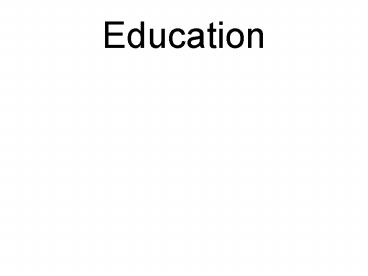Education - PowerPoint PPT Presentation
1 / 34
Title:
Education
Description:
Beer and Circus: Undergraduate Education at Large Public Universities. Functionalist Perspective ... Education as Beer and Circus. Current situation at large ... – PowerPoint PPT presentation
Number of Views:66
Avg rating:3.0/5.0
Title: Education
1
Education
2
- Insight provided by the three perspectives
- Contemporary issue related to education
- Beer and Circus Undergraduate Education at Large
Public Universities
3
Functionalist Perspective
- Education serves the following functions
- General socialization
- Shows individuals where they fit in
4
- Special skills
- Solution of social problems
- Substance abuse, teen pregnancy
5
Latent Functions
- Keeps down unemployment rate
- Sociality, finding a spouse
6
Conflict Perspective
- U.S. schools reproduce social inequality
- The hidden curriculum
- Class and race influence quality of education
received
7
Symbolic Interactionism
- Education as a self-fulfilling prophesy
- Rosenthal-Jacobsen Experiment
- Students in San Francisco given IQ tests
- Reported results to teachers
8
- This group did spurt ahead although initial
ability was no different than other students.
9
U.S. Education System
- If an unfriendly foreign power had attempted to
impose on America the mediocre educational
performance that exists today, we might well have
viewed it as an act of war! (A Nation at Risk
1983)
10
(No Transcript)
11
Explanations
- More students with poorer preparation taking the
exam - Social promotion
- Low expectations --- teachers/peers/parents
12
KIPP Charter Schools
- Knowledge Is Power Program
- Started by two Teach for America teachers, David
Levin and Michael Feinberg, in 1992 - 60 percent more time in school than average
public school students, typically from 730 a.m.
until 500 p.m. on weekdays, every other
Saturday, and for three weeks during the summer.
13
(No Transcript)
14
Explanations
- More students with poorer preparation taking the
exam - Social promotion
- Low expectations --- teachers/peers/parents
15
Average Annual Salaries (BLS 2004)
16
Contemporary Issue
- The Quality of Higher Education in the United
States - Or
17
- Beer and Circus How Big Time Sports is
Crippling Undergraduate Education - By Murray Sperber
18
Higher Education as Beer and Circus
- Current situation at large public universities
- Drinking is excessive and problematic
- Sports siphon money from educational efforts
19
After the Baby Boom Generation
- Public spending for higher education declined as
a percent of costs - To maintain funding, colleges needed to increase
undergraduate enrollment
20
To Increase Undergraduate Enrollment
- A. Gain notoriety and prestige
- Belief in the Flutie Factor
21
2. Recruit prestigious research faculty
- Pohl Cottrell Scholar of Research Corporation in
2003. Recipient of a National Science Foundation
CAREER award in 2004 and was named an Alfred P.
Sloan Research Fellow in 2005.
22
- C. Active Greek life and party atmosphere
23
Princeton Reviews Party Schools 2006
- Based on student surveys about school academics,
campus life and student body, as well as study
hours, politics, and opinions.
24
- However, big time sports and star faculty cost a
lot of money. - Of the 1,266 schools in the NCAA in 2006,
- (Wall Street Journal, 10-19-07)
- Therefore,
25
- Divert money from undergrad. education
- Star faculty want to focus on their research
- Teaching undergrad. courses is a misuse of the
great persons talent
26
Impact on Undergrad. Education
- Great researchers are not necessarily great
teachers - Greater use of graduate students, adjuncts
27
Percent Distribution of Grades in 100 and 200
Level Courses. LAS College, ISU
28
Grade Distribution by ISU Colleges. 100-200
level courses. 2004-05
29
- Placate with honors classes, learning communities
- Student subcultures
- Collegiates
- Academics primary goal
- Vocationals primary goal is a occupational
training - Rebels primary goal is ideas and learning, but
critical of the academic process.
30
Soc. 134 Student Subcultures
31
How Students Spend their Time (Soc. 134) 21-5
hrs/wk, 36-10, 411-20
32
Experience with Alcohol
33
How Subcultures Spend their Time (Hours/Wk)
There are 168 hours in a week
34
Value of Sperbers Beer and Circus
- Functionalist theory
- Vocational skills, maintains status quo
- Conflict theory
- reinforces class structure, inequality
- Symbolic interactionism theory
- subcultures, identity































